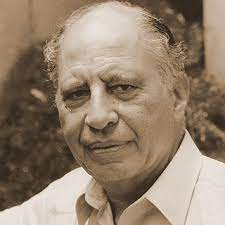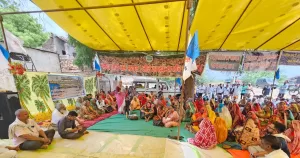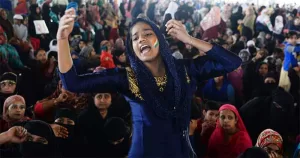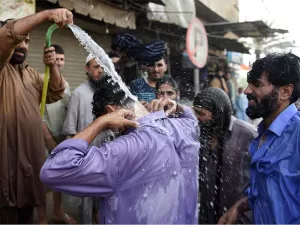❈ ❈ ❈
– Keki Daruwalla
Words have stampeded (the children are dying)
The herdsmen have left ( their children dying)
You only have words and words are no use
Condemning the killers is it any use?
Worse than the killers are doctrines foot loose
That propel them and bolster their fingers and hands
As they go round the neck of the girl like a band.
A girl who loved meadows, (who wouldn’t love meadows?)
And horses grazing on pasture and meadow
The father with a staff like a prophet of yore
Old Testament opens up, Moses and more
They were all shepherds blistered , footsore,
Their faces as rough as the sand that they trod
but never confronted this kind of gore.
And our two ministers, they sure were not sighing
Our two ministers they sure were not crying,
They never spoke up for the girl who was raped
nor a handful of dust on the grave of the dying.
(Keki Daruwalla writes poetry and fiction. He won the Commonwealth Poetry Award (Asia) for his poetry volume ‘Landscapes’. Poem courtesy: India Cultural Forum, a group of cultural activists and academics, who see India as part of a rich and plural heritage, and seek to build on this heritage for a more just, egalitarian and humane society.)
❈ ❈ ❈
A Song from the Ruins
I stand on these ruins with my weary steps
Like in Harappa or in Hampi
Once this was a nation
A continent built in salt and sweat
A flower raised by blood
A conch risen from the sea
A map of many colours drawn in tears
Extending from the Himalayas
To the Arabian Sea.
Now I see the festival of the people
Turn into a funeral procession in black
And triumphal chants into laments
One tale for each murder
One battle for each memory
One more Partition in every heart
There was a time when we treated
Even our conquerors like guests
They turned our land into a rainbow,
Left in our treasury life-styles,
Languages, arts, cultures.
But those who chose to play the coloniser,
We fought as one person.
We won freedom despite your betrayal,
We created a nation where no faith
Was alien; no tongue, foreign
Even in the darkness of the dispossessed
Flickered the fragrant moonlight of hope.
The moment you raised your
Banner of hate and greed, people’s flag
Became a rag, and their anthem an elegy.
You came with another history,
With another geography and arithmetic.
You robbed us of our woods and lands
For your masters, scared the down-trodden
Shaking your weapons. You feared
Those who tell the truth, extended
Poison vials to those on the brink of
Suicide, let loose the demons of
The netherworld on earth.
We were a nation, but now we are dust.
Even in this dust are the cries of the
Imprisoned stones, the songs of the
Survivors, bleeding memories rising
From the dead on the gravestones’ grass,
Letters blossoming on the violins ascending
The clouds, pale angels flying to the sky from the
Waste-heaps, the white horses of untamed desire,
Pigeons, pigeons.
We will come back,
From the empty barns dreaming of the sun
Even in winter, from the odours
Of piss and pollen in the alleys,
From the joy that fills breasts, oranges and poems,
From the turbid pools of remembrance,
From the days that enter the fishermen’s cottages
Like rain-drenched dogs, from the
Flying brooms, from the clothes of miners
Stained with oil and coal, from the pictures of
Wild goddesses drawn in the tribal hamlet
With the quills of quails, from the
Brave memories casketed in language,
From the unpolished words carried by
The pariah’s wounds, from the trampled
Plant of the night with its golden leaves,
From roots, from roots.
We will raise a new nation, of compassion and
Sisterhood that laughs without hate, a nation,
Without walls and borders, without
the rich and the poor, its head held high,
And its arms open to all, here,
On this soil of dried-up rivers and heirless forests
Where evening stars fall like magnolias, we lay
Seven stones.
(K. Satchidanandan is a poet, art critic, essayist and public intellectual. Courtesy: The Beacon, a web-based only feature magazine of writing and reading (long-form essays, fiction and poetry) that believes in confluences more than in consensus.)
❈ ❈ ❈
– Gulzar
The pandemic raged.
The workers and labourers fled to their homes.
All the machines ground to a halt in the cities.
Only their hands and feet moved.
Their lives they had planted back in the villages.
The sowing and the harvesting was all back there:
Of the jowar, wheat, corn, bajra—all of it.
Those divisions with the cousins and brothers.
Those fights at the canals and waterways.
The strongmen, hired sometimes from their side and sometimes from this.
The lawsuits dating back to grandparents and grand uncles.
Engagements, marriages, fields.
Drought, flood, the fear: will the skies rain or not?
They will go to die there—where there is life.
Here, they have only brought their bodies and plugged them in!
They pulled out the plugs:
‘Come, let’s go home’—and they set off.
They will go to die there—where there is life.
[Gulzar (born Sampooran Singh Kalra; 18 August 1934) is an Indian Urdu poet, lyricist, author, screenwriter, and film director known for his works in Hindi cinema. He is regarded as one of greatest Urdu poets of this era. Poem translated into English by Rakhshanda Jalil. Poem courtesy: National Herald.]




